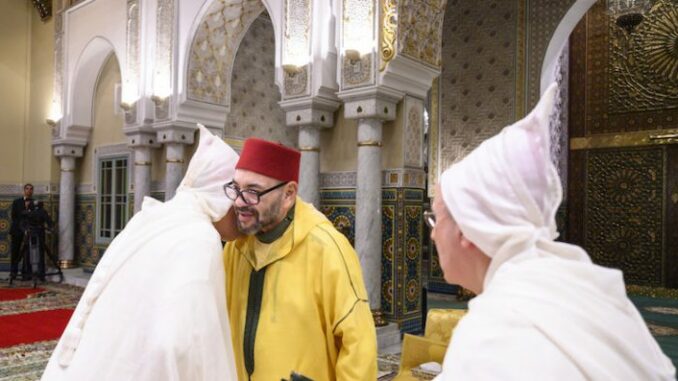
King Mohammed VI, Commander of the Faithful, accompanied by Crown Prince Moulay El Hassan, Prince Moulay Rachid and Prince Moulay Ismail, chaired, on Wednesday at the Royal Palace in Casablanca, the 4th religious lecture of the holy month of Ramadan.
This lecture was delivered by the Dean of Jordan’s Sharia School, Abderrahmane Ibrahim Zaid Al Kilani, on the topic “the finalities of the Holy Quran and the construction of common and unifying human values.”
At the beginning of the talk, the speaker pointed out that one of the great purposes of the Holy Qur’an is to bring the peoples of the earth closer together and to strengthen cooperation among them, regardless of their races, colors or religions, and to build human convergence points that constitute bridges in cooperation among humankind.
He explained that the thirteenth verse of Surah al-Hujurat, the subject of this talk, is a kind of constitutional rule for achieving brotherhood among people, in that it shows the way to the achievement of brotherhood and mutual knowledge, considering that ignorance is the source of denial, contempt and suspicion and that the concept of mutual knowledge refers to the recognition of the existence of the other. This example sums up the effort of all mankind in the current era to establish a number of systems related to human rights.
The dean of the Sharia faculty at the University of Jordan considered that the content of the verse can only be invoked through its implementation on the ground, as it is one of the prescriptions that Muslims have towards themselves and other peoples.
The speaker dwelt at this point on the Qur’anic civilizational vision which is based on understanding and cooperation between human societies for the welfare of all, through the rejection of any form of racial discrimination, pointing out that this vision invites people to transcend rivalries and confrontations, and encourages them to come closer and respect the similarities between nations at the level of thought and creativity.
Professor Al-Kilani insisted that the world today urgently needs to activate this Quranic discourse as an entry point for the mutual knowledge of peoples, nations and civilizations, and for the dissemination of the values of forgiveness and tolerance instead of belligerent behaviors, especially in the context of the hateful discourses that fuel many human groupings.
He mentioned the contribution of the scholars of the Ummah in this field, especially their contribution to the five goals agreed upon by all human societies, which are: religion, soul, offspring, spirit and money. These great Quranic goals, he said, are capable of integrating the countless contemporary methods of building convergent goals, such as cooperation in the fight against poverty, hunger and unemployment, the fight against diseases and the preservation of the environment.
In addition to the cooperation in these vital areas strongly encouraged by the Holy Quran, the other area to which the Holy Quran has given the greatest care is that of shared human values.
The dean of the Sharia faculty at the University of Jordan noted that despite the fundamental differences between the ethical theory of the Holy Quran and the ethical theory of the materialistic philosophies and positivist doctrines, there is a wide space of sharing and human rapprochement at the level of many values and virtues, knowing that the natural instinct with which God created man is an essential source of developing moral values.
The triumph of moral values constitutes a victory for Islam and would result in the realization of the purposes enshrined in the Holy Qur’an and the objectives that the message of Islam and the revealed books carry.
At the end of the lecture, King Mohammed VI was greeted by Malian Minister of Foreign Affairs, Mohamed Kone; Malian Minister of Religious Affairs, Professors Qotb Sanou; Secretary General of the Academy of Islamic Fiqh of Guinea; former professor of law at the University of Richmond in the United States Aziza Yahya Mohamed Taoufiq al-Hibri; member of the Supreme Council of Sharia in Lebanon Mazhar Mohammed al-Hamoui; as well as by heads of the section of the Mohammed VI Foundation of African Ulema in Burkina Faso, Gabon, Togo, Guinea Bissau, Djibouti, and Nigeria.
The Sovereign was also greeted by Sheikh Muhammad Al-Hafiz Al-Nahaoui, head of the Islamic cultural gathering in Mauritania and West Africa.
